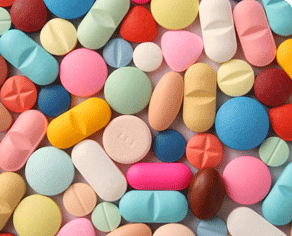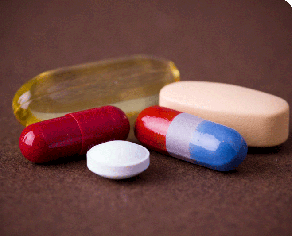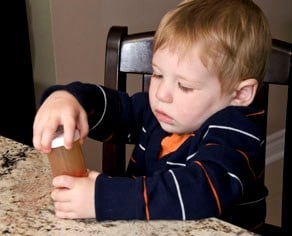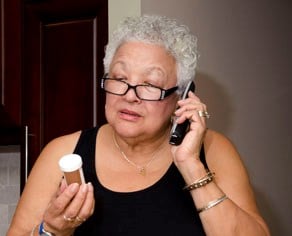Current Top 10 Exposures - 2024 Data

The Specialists in Poison Information document every call received by the Ontario Poison Centre. This data:
- Provides valuable information that can guide future treatment recommendations.
- Allows the Ontario Poison Centre to identify emerging trends around substances causing harm.
- Prevents unnecessary poisonous exposures and potential deaths.
The Ontario Poison Centre regularly determines "Top 10" lists, identifying the top ten most common types of exposures managed by the Specialists in Poison Information. Over time, these lists have changed, reflecting regulatory changes and other trends happening in Ontario. For instance, pain-relievers containing aspirin used to be one of the most common exposures until child-resistant packaging was introduced in the 1970s. Now, because of safer packaging and the availability of aspirin-free alternative pain relievers on the market, aspirin exposures rarely occur.

Top 10 Exposures in 2024: All Ages
Top 10 Exposures in 2024: All Ages
1. Pain Relievers - Medicines that are given to relieve pain are the most common exposure calls made to the Ontario Poison Centre.
2. Antidepressant Medicines - There are a variety of these medicines that are commonly prescribed for many reasons.
3. Household Cleaners - Bleach, all-purpose cleaners, detergents and disinfectants are easily accessed and often not stored safely. The Poison Centre has seen an increase in calls about these exposures during the pandemic. See our poison prevention tips to learn about storing these products safely!
4. Sleeping Medicines - Many people take a pill to help them fall asleep. These medicines are commonly found in people's homes and are commonly involved in overdose situations.
5. Personal Care Products - These include products like mouthwash, toothpaste, sunscreen, perfume, cosmetics, nail polish and nail polish removers, all of which should be locked up and out of sight like other chemicals in the household.
6. Alcohols - These may include products such as regular drinking alcohol, rubbing alcohol, windshield washer fluid and antifreeze.
7. Stimulants and Street Drugs - Stimulants, sometimes called “uppers”, temporarily increase alertness and energy. They are in a variety of street drugs but can also be found in prescription medicines such as some used to treat ADHD. Not all street drugs are stimulants - some are depressants (“downers”), or hallucinogens. There is no established “safe” amount of consumption for street drugs.
8. Heart and Blood Pressure Medicines - Medicines that are taken for certain heart conditions and to lower your blood pressure can be very dangerous if a young child gets into them by mistake, or if not taken as prescribed.
9. Anti-seizure medicines: Medicines to control seizure activity can be dangerous when taken incorrectly.
10. Allergy Medicines - Medicines that are taken for seasonal allergies or allergic reactions can be dangerous when taken incorrectly.


Top 10 Exposures in 2024: Children Under 6 Years
Top 10 Exposures in 2024: Children Under 6 Years
1. Pain Relievers - Medicines that are given to relieve pain are the most common exposure calls made to the Ontario Poison Centre.
2. Household Cleaners - Bleach, all-purpose cleaners, detergents and disinfectants are easily accessed and often not stored safely. The Poison Centre has seen an increase in calls about these exposures during the pandemic. See our poison prevention tips to learn about storing these products safely!
3. Personal Care Products - These include products like mouthwash, toothpaste, sunscreen, perfume, cosmetics, nail polish and nail polish removers, all of which should be locked up and out of sight like other chemicals in the household.
4. Vitamins – Make sure to teach young children that vitamins are medicine. Keep them locked up with the rest of your family’s medicine.
5. Foreign Bodies/Toys – Although these are not actually poisonous substances, they can still be hazardous due to the risk of choking or obstruction (becoming stuck during digestion).
6. Plants – Young children will often be tempted to bite into a leaf of a plant. Some are harmful and others are not. Know the names of plants growing in and around your home. Visit the Plants section of our website to learn more.
7. Skin Creams – There are many creams and ointments that are appealing to young children. These may include sore muscle rubs, steroid creams, wart removers, and calamine lotions.
8. Herbal & Homeopathic Remedies, Dietary Supplements – Remember – “natural” does not necessarily mean that it’s safe, especially for young children. Do not use these products without speaking with your doctor first and keep them locked up with your other medicines.
9. Pesticides – These substances are used to get rid of pests. Exposure to more dangerous pesticides is less frequent because of stronger regulation of these substances.
10. Antimicrobial Medicines – These medicines fight germs like bacteria (antibiotics), viruses (antivirals), fungi (antifungals) and parasites (anthelmintics).


Top 10 Exposures in 2024: Older Adults (Age 70+)
Top 10 Exposures in 2024: Older Adults (Age 70+)
1. Heart and Blood Pressure Medicines - Medicines that are taken for certain heart conditions and to lower your blood pressure can be very dangerous if a young child gets into them by mistake, or if not taken as prescribed.
2. Pain Relievers - Medicines that are given to relieve pain are the most common exposure calls made to the Ontario Poison Centre.
3. Hormones – Many seniors take medicine to help regulate their hormones. Mistakes in a medication regime can result in unintentional poisoning with these substances.
4. Antidepressant Medicines - There are a variety of these medicines that are commonly prescribed for many reasons.
5. Personal Care Products - These include products like mouthwash, toothpaste, sunscreen, perfume, cosmetics, nail polish and nail polish removers, all of which should be locked up and out of sight like other chemicals in the household.
6. Sleeping Medicines - Many people take a pill to help them fall asleep. These medicines are commonly found in people's homes and are commonly involved in overdose situations.
7. Stomach Remedies – These include products like laxatives, anti-diarrheal medicines, and antacids.
8. Household Cleaners - Bleach, all-purpose cleaners, detergents and disinfectants are easily accessed and often not stored safely. The Poison Centre has seen an increase in calls about these exposures during the pandemic. See our poison prevention tips to learn about storing these products safely!
9. Blood Thinners – These medicines are prescribed to prevent blood clots. If taken incorrectly, they may cause unwanted symptoms such as bruising or bleeding.
10. Other Prescription Medicines – Many people take prescription medicines as they age. A variety of medicines may be involved in overdose situations.

